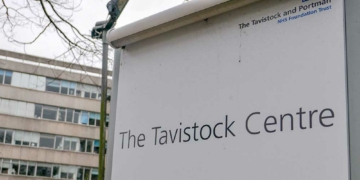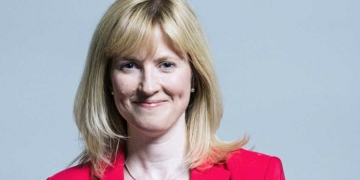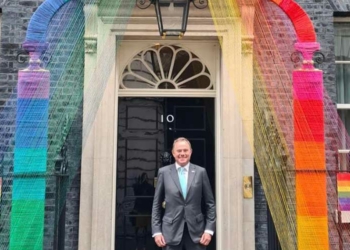A friend of mine has been to hell and back in the past couple of years, after falling foul of homophobic neighbours. He taped all the abuse and kept a journal of the harassment, but the police made it clear he was on his own unless he was beaten up or burned out of his house.
He was contemplating suicide when a miracle happened, in the shape of Galop, the LGBT+ anti-violence charity. Thanks to the latter’s intervention, the family were evicted and the main abuser was charged and successfully prosecuted. My friend has his life back and he can’t praise Galop highly enough.
The name, short for Gay London Police Monitoring Group, was a blast from the past for me. The group was founded in 1982, in the days of ‘pretty policing’, when good-looking young officers were used to entrap gay men. By the mid-1990s, when I worked for the London paper Capital Gay, that practice had largely ended, but it left a deep legacy of distrust. Victims of queerbashing at cruising areas were often frightened to go to the police, since outdoor gay sex was illegal and they feared they’d be criminalised, like rape victims in Saudi Arabia who end up getting flogged for adultery. Galop was a vital intermediary.
Given the way the police drape themselves in rainbow flags nowadays, I was surprised the charity still exists, but it has actually expanded. A one-man band in the Nineties, it now has 21 employees, according to Charity Commission records, and received nearly £1.4 million from government contracts last year.
So far so good, but I was disturbed the other day when the journalist (and regular LGN contributor) Jo Bartosch tweeted that she was blocked by Galop, even though she had never interacted with its Twitter account. A number of other women said they were in the same position, include the radical feminist Belstaffie, who tweeted: ‘Maybe it’s because I’m a lesbian.’
In every case, those blocked were gender critical – i.e. they regularly speak out against what they see as the misogyny and homophobia of the extreme gender ideology which has caused an ugly split in our community.
In every case, those blocked were gender critical – i.e. they regularly speak out against what they see as the misogyny and homophobia of the extreme gender ideology which has caused an ugly split in our community. It looked very much as if Galop was furthering that split by using one of the ‘t*rfblocker’ lists created by trans rights activists.
I’m on some of those lists too. I wasn’t blocked in this case, but I chipped into Jo’s Twitter thread to say I was shocked that the charity was effectively closed to lesbians. I added: ‘[Galop] helped my mate last year. I was interested to hear that they were still going and pleased their intervention was so effective. That’s why I find this so troubling: they’re basically saying that if Jo were suffering homophobic harassment, they wouldn’t help her.’
You might think the charity would be keen to deny that suggestion, since it takes public money for helping lesbians faced with violence and abuse. That’s not what happened. Instead it blocked me too. After I’d publicly praised their service!
You might say this is just the Twitter account, which doesn’t necessarily reflect the charity’s core operations, and that’s true enough. Plenty of organisations have been embarrassed by a social media operator going rogue. Since then, however, Jo has emailed Galop asking for an explanation and, as I write, has had no reply. At the very least, we can say that a charity paid by the taxpayer to provide services to a particular community is strongly signalling that its door is not fully open to every member of that community.
Imagine this happening in any other sphere. Firefighters asking which way you vote before they rescue you from your burning house? No way. Your GP checking for wrongthink before they’ll put you on their register? Wouldn’t happen. Hospitals withholding cancer treatment from patients who don’t put pronouns in their bio? Again, it’s unthinkable. Public services don’t discriminate like that and there would be an outcry if they did.
Imagine this happening in any other sphere. Firefighters asking which way you vote before they rescue you from your burning house? No way. Your GP checking for wrongthink before they’ll put you on their register? Wouldn’t happen. Hospitals withholding cancer treatment from patients who don’t put pronouns in their bio? Again, it’s unthinkable. Public services don’t discriminate like that and there would be an outcry if they did.
This is only conceivable in our community because gender identity extremists think normal rules don’t apply to them. Until recently, they’ve been right about that: they’ve been allowed to run amok, demanding total submission to their ideas on pain of cancellation, and the pink media have been their enforcers not their scrutineers. (Not any more: to many people’s immense relief, the birth of this publication means we finally have a press with teeth again.)
In Galop’s case, hardline gender ideologues are well represented in its leadership. One of its trustees, Jay Stewart, is the CEO and co-founder of Gendered Intelligence – one of those T organisations which strangely doesn’t get branded a hate group for excluding the LGB. Another is Bex Stinson, Stonewall’s former head of trans inclusion work. And its new CEO is Leni Morris, a former Pride, Amnesty International and Stonewall staffer, and the ex-chair of Stonewall’s Ace Network.
According to Stonewall, ‘ace’ is ‘an umbrella term to incorporate asexual, grey ace, demi-ace, and other ace-spec identities’ (nope, me neither) and ‘ace people have always been part of the LGBT+ community and queer activism, but are often erased from the narrative’. It’s true: people who don’t like sex aren’t often mentioned in the same breath as homosexual people who have been historically persecuted by state and citizens alike. That’s because they have no earthly reason to be.
By all means include trans people in Galop’s work, because they are also victims of violence and abuse. But there is a big difference between including trans clients in the charity’s remit and insisting on acquiescence to every last demand of the extreme trans movement as a condition for receiving its support.
If Galop were doing a good job and fulfilling its remit, its apparent capture by gender-woo hardliners, and by people desperate to identify as oppressed, might not matter.
That’s certainly what I’d have said last week, based on my friend’s experience. But after seeing the charity’s high-handed behaviour on Twitter, excluding lesbians and gay men in the name of inclusion, I’m no longer so sure. It now looks like a classic example of the cuckoo-in-the-nest takeover we’ve witnessed in the past five or six years in institution after institution.
By all means include trans people in Galop’s work, because they are also victims of violence and abuse. But there is a big difference between including trans clients in the charity’s remit and insisting on acquiescence to every last demand of the extreme trans movement as a condition for receiving its support.
So here’s the crucial question: if I, or anyone else on Galop’s blocklist, were the target of homophobic violence, would the service come to our aid? If the answer is no, I reckon it’s time the government gave those lucrative contracts to someone else.
Simon Edge’s fifth novel, The End of the World is Flat, is out from Lightning Books in August.
























Interesting piece thank you.
Seems there are a lot of charities that need to be investigated, and held to account for the way they have been run.